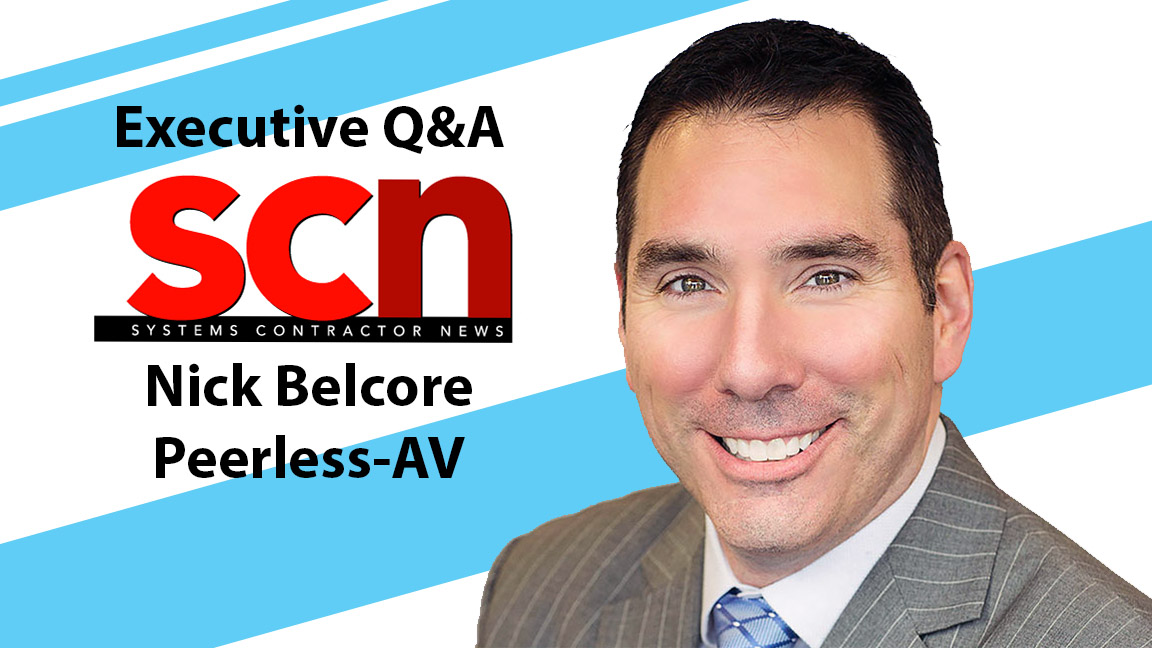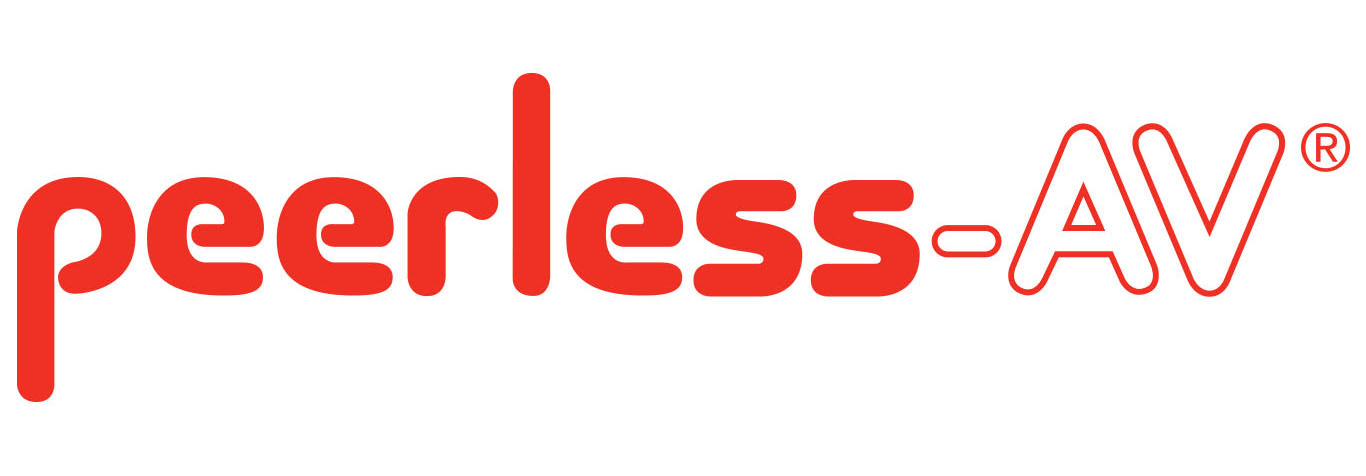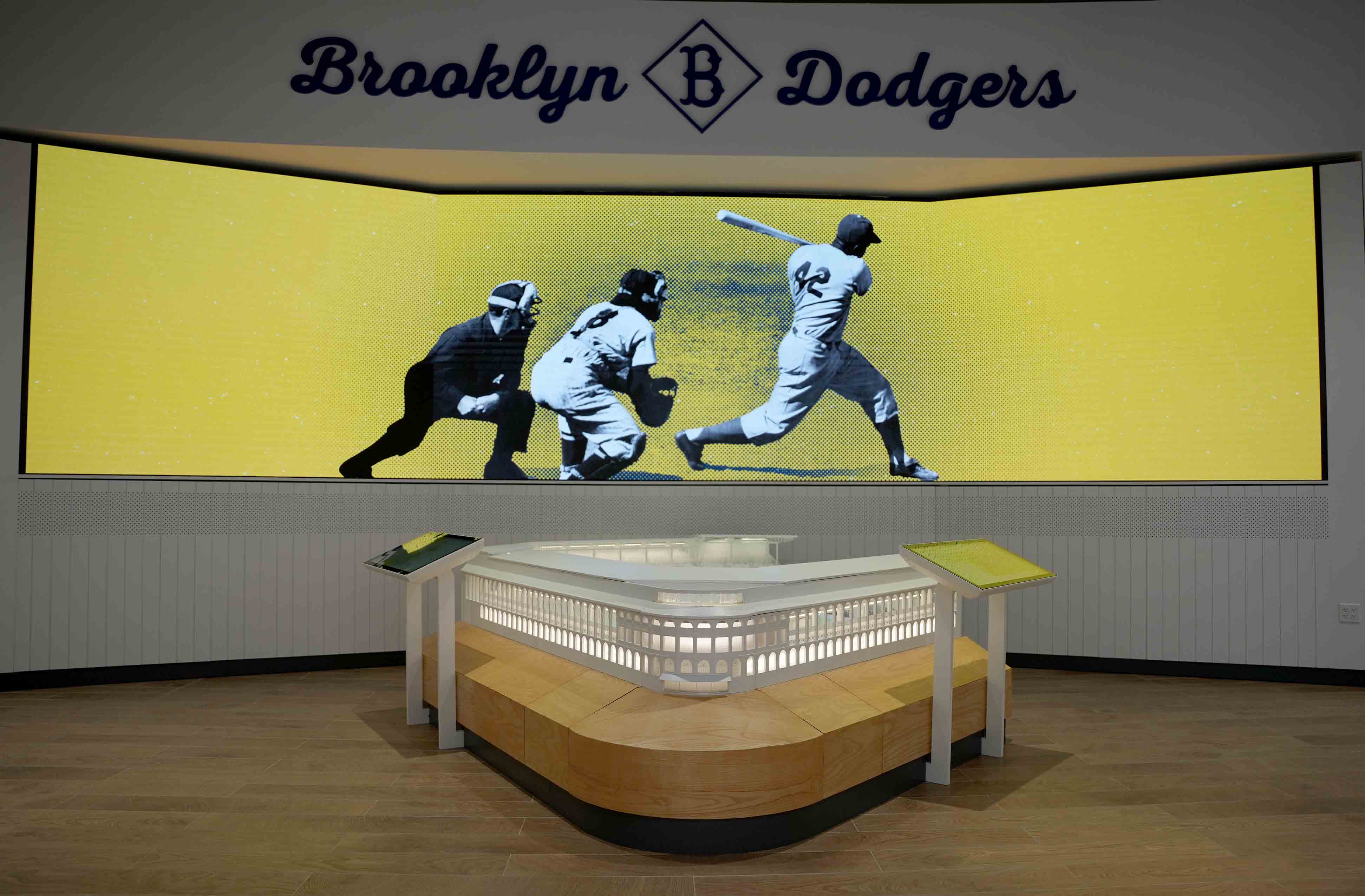
SCN: How long have you been with this company, and what are your responsibilities?
Nick Belcore: I joined the AV industry from life sciences and healthcare in 2006, a sector that was changing substantially at the time and greatly restricted the ability to disseminate information and add value. When the opportunity presented itself to come over to the AV world, this offered me the chance to lead a national sales team in a way I deemed best for the long-term benefit of the company, while simultaneously adding substantial value to our customers and partners. That role then grew into a global opportunity to advance not only our sales efforts but our marketing initiatives as well.

In my role, I have both a personal and business responsibility to take Peerless-AV in a direction that benefits the planet. For next year and beyond, my plans are to steer the business in ways we can utilize our capabilities towards endeavors that make us better global citizens. Renewable and alternative energy excites not only me but everyone on the global board at Peerless-AV.
[Executive Q&A: All About the Pixels]
In all our endeavors, we will continue to utilize AV to have a positive impact on the communities we serve. Our focus on dvLED is very much a priority as the technology provides a blank informational and entertainment-based canvas for private entities and municipal organizations to utilize to the benefit of all. We’re making waves in the industry with our SEAMLESS by Peerless-AV dvLED video wall integration program. The need for immersive experiences will always be there and has always been an intrinsic part of human learning, and we are focused on making that technology deployable cost effectively for all markets.
SCN: Earlier this year, Peerless-AV updated its Smart City Kiosks. How healthy is the kiosk business?
NB: Our kiosk business is doing extremely well—and I’m speaking from a global perspective. We’ve shipped some significantly sized orders of indoor and outdoor displays from our facilities in the U.K. and Aurora. Seeing them all lined up in the warehouse is always a sight to behold.
Both dvLED and LCD panels can provide great results, but each has key characteristics that can affect the overall results.
As you rightly call out, our Smart City Kiosks were updated earlier in the year. Key upgrades facilitate a simplified installation for running power and data cabling while offering an environmentally protected dedicated storage space for media components. The dual-sided model is new to the range, offering increased screen space and opportunities for revenue-generating digital advertising and wayfinding. Both single and dual-sided models are proving very popular, especially for government, transportation, and visitor attractions.
SCN: What is some advice you would give to companies considering outdoor locations for displays like kiosks or digital menu boards?
NB: The primary consideration is to correctly ascertain traffic, both foot and vehicular, to get the best return on your investment. Once determined, especially in an outdoor setting, it is imperative to understand the conditions that will be encountered by the technology you are deploying. Is the screen facing west and will it take a solar beating? If so, the most thermodynamically robust display needs to be used to give you the most reliable performance. Are you deploying in an area where moisture, insects, or circulating dust particles are likely to ingress into the display? The highest ingress protection rating will provide you with your best countermeasure to these potentially damaging variables. All of Peerless-AV’s outdoor solutions are all-weather certified and are among the highest operating temperature range and ingress protection solutions available on the market, making them a durable, high-quality viewing experience, no matter where the solution is placed.
SCN: Peerless-AV offers indoor and outdoor mounts—what are some of the significant differences between them?
NB: While every Peerless-AV mounting system is built to last with high-quality materials, mounting solutions made for outdoor displays are designed specifically to withstand outdoor conditions. Our outdoor mounts are made of heavy gauge steel and finished with corrosion-resistant coating and stainless-steel hardware, making them weatherproof. Many of our outdoor solutions also have high wind ratings and anti-theft mounting hardware for added protection.
SCN: You showed the SEAMLESS Kitted Series Universal dvLED Mounting System at InfoComm. What makes it different from other mounting solutions?
NB: Seeing is believing in this product because of its simplicity. Lack of standardization has been a barrier to easier dvLED deployments. What makes the DS-LEDUNV mount truly universal are the unique quick connect clamps, which remove the need for dedicated adaptors. These clamps are fundamental for quick and easy latching of the dvLED cabinets along the mount frame, and they also include Y-axis (height) adjustment to make the whole process uncomplicated. Z-axis (depth) adjustment is important when mounting to imperfect wall surfaces, and the DS-LEDUNV offers an industry-leading 3/4 inch or 20mm (+/- 10mm). The X-axis (width) determines the horizontal movement of the cabinets, so that when hanging to the frame, they can be adjusted to latch softly to each other to ensure no damage to pixels.
SCN: What advice would you give to a potential customer if they can’t decide between a single-panel display or a dvLED solution?
NB: Both dvLED and LCD panels can provide great results, but each has key characteristics that can affect the overall results. The decision all comes down to your unique design, budget considerations, and overall goal for the displays—from distance to content, type of venue, and whether touch-based interactivity or rotating images and content are required. Both dvLED and LCD video walls are well suited for large-scale deployments, but dvLED allows for virtually infinite size options as well as more shape and configuration possibilities that extend beyond LCD’s form limitations. dvLED solutions also provide seamless image quality in larger form factors, removing the visual breaks so often associated with LCD video walls.
[Executive Q&A: Technology Meets Vibe]
However, installations of dvLED solutions still tend to be more expensive, despite price decreases and increased availability in the channel over the past few years, while LCD has made its large-format displays of 86 inches and above significantly more affordable. Historically, dvLED has been more challenging to specify and stock and has been more time-consuming to install, since all LED display brands have different size cabinets and latching mechanisms. However, all this is now being addressed with our Kitted Series Universal dvLED mount.
Today, for very close viewing distances, LCD still has the upper hand, but dvLED is gaining on LCD as a technology. LCD still leads the market from an up-close touch and interactivity standpoint, making it an ideal solution for many K-12 classroom and corporate boardroom settings. It all comes down to a matter of application and functionality—and which technology best aligns with those needs as well as budgetary constraints.

SCN: What’s one of the more recent and unique dvLED installations that Peerless-AV has been part of?
NB: In collaboration with Ideum, Gensler, and the Jackie Robinson Museum, Peerless-AV designed and engineered a custom SEAMLESS Bespoke Mounting System to support the dvLED video wall backdrop that provides attendees with a look into the life and history of Jackie Robinson. The installation, a central media delivery tool for the museum, provides an immersive way for attendees to view snippets of Jackie’s career achievements, and offers a space for people to come together to appreciate each other’s humanity and diverse experiences.
[Viewpoint: Here Comes Convergence]
SCN: Where do you see displays for the Pro AV industry heading in the next few years?
NB: The emergence of machine learning and artificial intelligence is going to accelerate at a geometric rate—and will become resident in products and in the data that drives technology and hardware development. Displays for Pro AV will evolve to make use of this new data and machine learning to create a seamless interface between the user and technology.







